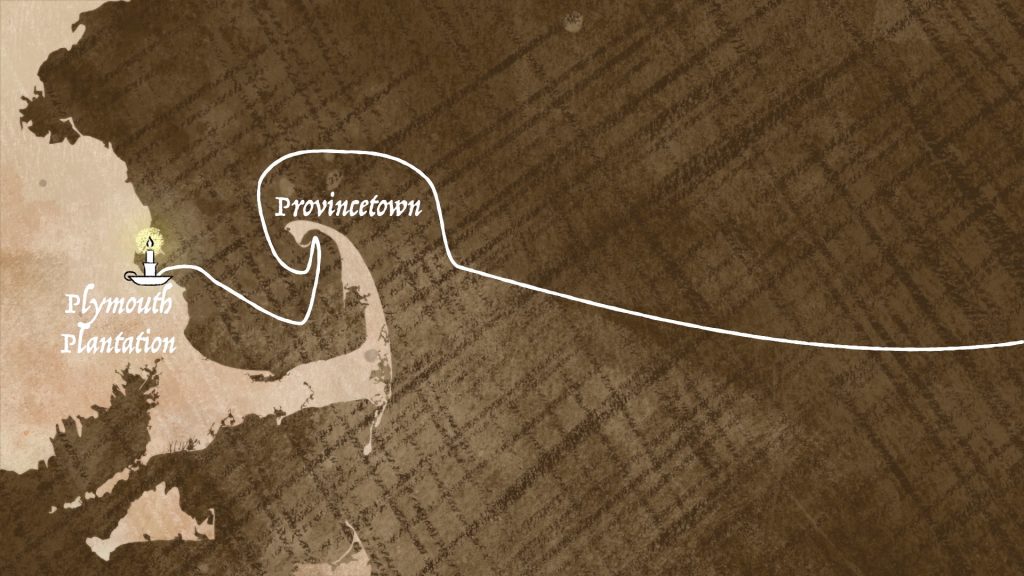Forming a ‘civil body politic’

Once they arrived on the shores of America in mid-November, the Pilgrims faced a hard winter, realised they needed a new legal agreement, and managed to survive thanks to help from the Wampanoag Native Americans who already lived there.
The ship stopped just off the coast of modern-day Provincetown in Massachusetts, some way off from their intended destination to the south in Virginia. They needed to find a suitable place to live, so some of the men were sent out to scout the coast around Cape Cod. The rest of the passengers stayed aboard the ship for some weeks.
William Bradford, who would become the new colony’s Governor within the year, recalled their arrival in his diary. The exploring party briefly encountered some Native Americans near the shore and later came upon an abandoned settlement where they found buried seed corn, something they’d never seen before. They took this to use for planting the next year. The place was deserted after a period known as the Great Dying, when many indigenous people died from diseases brought by European colonists and explorers.
Back on the ship, they needed to come to some agreement among themselves – to ensure their own survival:
“… a combination [agreement] [was] made by them before they came ashore, being the first foundation of their government in this place; occasioned partly by the discontented & mutinous speeches that some of the strangers amongst them had [made] – that when they came ashore they would use their own liberty; for none had power to command them, the patent [permission] they had being for Virginia, and not for New-England, which belonged to another Government, with which the Virginia Company had nothing to do.”
‘Strangers’ was a term used by the Separatists to mean anyone who wasn’t a member of their religious group. The two groups clearly had difficulty getting along, and so they needed to agree how best to work together. Bradford recited the Compact’s terms as follows:
“In the name of God, Amen.
We whose names are underwritten, the loyal subjects of our dread sovereign Lord, King James, by the grace of God, of Great Britain, France, & Ireland king, defender of the faith, &c., having undertaken, for the glory of God, and advancement of the Christian faith, and honour of our king & country, a voyage to plant the first colony in the Northern parts of Virginia, do by these present solemnly & mutually in the presence of God, and one of another, covenant & combine ourselves together into a civil body politic, for our better ordering & preservation & furtherance of the ends aforesaid; and by virtue hereof to enact, constitute, and frame such just & equal laws, ordinances, acts, constitutions, & offices, from time to time, as shall be thought most meet & convenient for the general good of the Colony, unto which we promise all due submission and obedience.
In witness whereof we have hereunder subscribed our names at Cape Cod the 11 of November, in the year of the reign of our sovereign lord, King James, of England, France, & Ireland the eighteenth, and of Scotland the fifty fourth. Anno. Dom. 1620.”
It was signed by the men, in an effort to pull together the disparate group of passengers and their families.
Many of their struggles were only just beginning, but it was thanks to meeting Squanto and Samoset – two local Native Americans – that they were able to grow crops they weren’t familiar with and survive. These men spoke English because they’d been captured previously to be sold as slaves in Europe. Somehow, they had returned home, only to find many of their people had died.
This is the final post for our PilgrimAGE series, which culminated in the 400th anniversary of the Mayflower’s voyage this week, on Wednesday 16th September 2020. To mark that historic moment, Mayflower 400 released a new online documentary produced by the History Hit team and presented by historian Dan Snow, so if you’ve found the story interesting, you might also like to watch the documentary below or listen to Dan Snow’s Mayflower podcast.